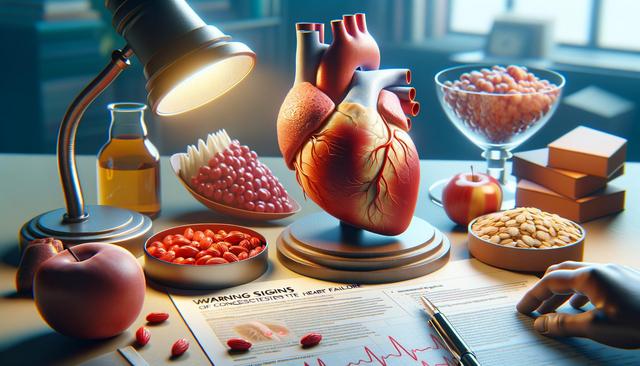Recognizing the Warning Signs of Congestive Heart Failure
Congestive heart failure can develop slowly, making it easy to miss early signs like fatigue, swelling in the legs, or shortness of breath. Understanding these subtle changes may help with early detection and timely care. Learn what to watch for and when it’s time to speak with a healthcare provider.

Understanding What Congestive Heart Failure Is
Congestive heart failure (CHF) is a chronic condition where the heart struggles to pump blood efficiently. This inefficiency causes blood and fluid to back up in the lungs, legs, and other parts of the body. While the term ‘heart failure’ may sound sudden or dramatic, CHF often develops gradually, and symptoms can be subtle at first. The condition is typically the result of other underlying health issues such as high blood pressure, coronary artery disease, or diabetes. By understanding what CHF is and how it progresses, individuals can be better prepared to recognize early signs and seek medical guidance before the condition worsens.
CHF can affect either the left side, right side, or both sides of the heart. Left-sided heart failure is more common and usually leads to fluid build-up in the lungs, causing breathing difficulties. Right-sided heart failure often leads to swelling in the legs and abdomen. Recognizing which side is affected can help in identifying the specific symptoms and receiving appropriate treatment. Since CHF is a progressive condition, early detection and lifestyle management can significantly improve quality of life and delay further complications.
Common Physical Symptoms You Shouldn’t Ignore
One of the main challenges with CHF is that its early symptoms are often mistaken for signs of aging or lack of fitness. However, recognizing these symptoms early can make a critical difference. Physical signs to monitor include:
- Persistent fatigue or weakness, especially after light activity
- Shortness of breath during exertion or while lying down
- Swelling in the ankles, legs, or abdomen
- Rapid weight gain due to fluid retention
- Frequent coughing or wheezing with white or pink-tinged phlegm
These symptoms occur because the heart is no longer able to pump blood efficiently, leading to fluid accumulation and reduced oxygen delivery throughout the body. Fatigue results from reduced blood flow to muscles, while shortness of breath is caused by fluid backing up into the lungs. If these signs appear and persist, it’s important to consult a healthcare provider for a thorough evaluation.
Changes in Daily Function and Lifestyle
Congestive heart failure doesn’t just affect physical health; it also impacts how individuals function in their daily lives. A person might notice a reduced ability to perform routine activities such as climbing stairs, walking short distances, or carrying groceries. These limitations may appear gradually, making them easy to overlook. However, they are often early indicators of heart function decline.
Other changes to watch for include:
- Difficulty sleeping flat due to shortness of breath
- Waking up suddenly at night gasping for air
- Increased need to urinate at night
- Lack of appetite or nausea
When these symptoms start to interfere with daily routines, it’s a sign that the heart may be under strain. Even subtle shifts in energy levels or sleep quality can be meaningful. Tracking these changes and discussing them with a healthcare provider can support early intervention and effective treatment planning.
Emotional and Cognitive Signs to Be Aware Of
While the physical symptoms of CHF are more widely recognized, the emotional and mental effects are often underestimated. People living with CHF may experience depression, anxiety, or cognitive issues. These symptoms can develop due to reduced oxygen flow to the brain or the emotional burden of managing a chronic illness. It’s important to consider mental wellness as part of the overall picture when evaluating the possibility of heart failure.
Some emotional and cognitive signs to monitor include:
- Confusion or difficulty concentrating
- Memory problems
- Feelings of sadness or helplessness
- Increased irritability or mood swings
These symptoms can be influenced not only by the physical limitations caused by CHF but also by the lifestyle adjustments needed for management. Support from mental health professionals, caregivers, and family members can play a vital role in coping with these changes and improving overall well-being.
When to Seek Medical Attention
Knowing when to reach out for medical help is crucial. While occasional fatigue or swelling could result from many causes, persistent or worsening symptoms should never be ignored. Early medical intervention can slow disease progression and enhance quality of life. Individuals should contact a healthcare provider if they notice:
- Sudden weight gain of more than two to three pounds in a day or five pounds in a week
- Increased shortness of breath, especially when lying flat
- New or worsening swelling in the legs or abdomen
- Persistent coughing or chest discomfort
- Irregular or rapid heartbeat
Medical professionals may use tools such as echocardiograms, blood tests, and physical exams to diagnose CHF and determine its severity. Early diagnosis allows for more effective management strategies, including medication, lifestyle changes, and sometimes surgical options. Regular checkups and open communication with a healthcare provider are essential for monitoring symptoms and adjusting treatment as needed.
Conclusion: Stay Informed and Proactive
Congestive heart failure is a serious condition, but early recognition of its signs can lead to better outcomes and improved quality of life. By paying attention to subtle physical, emotional, and lifestyle changes, individuals and their families can take timely action. If you or someone you care about is experiencing persistent symptoms like fatigue, swelling, or shortness of breath, it’s wise to consult with a healthcare provider. Staying informed, tracking changes, and seeking care early can make a meaningful difference in managing this chronic condition.